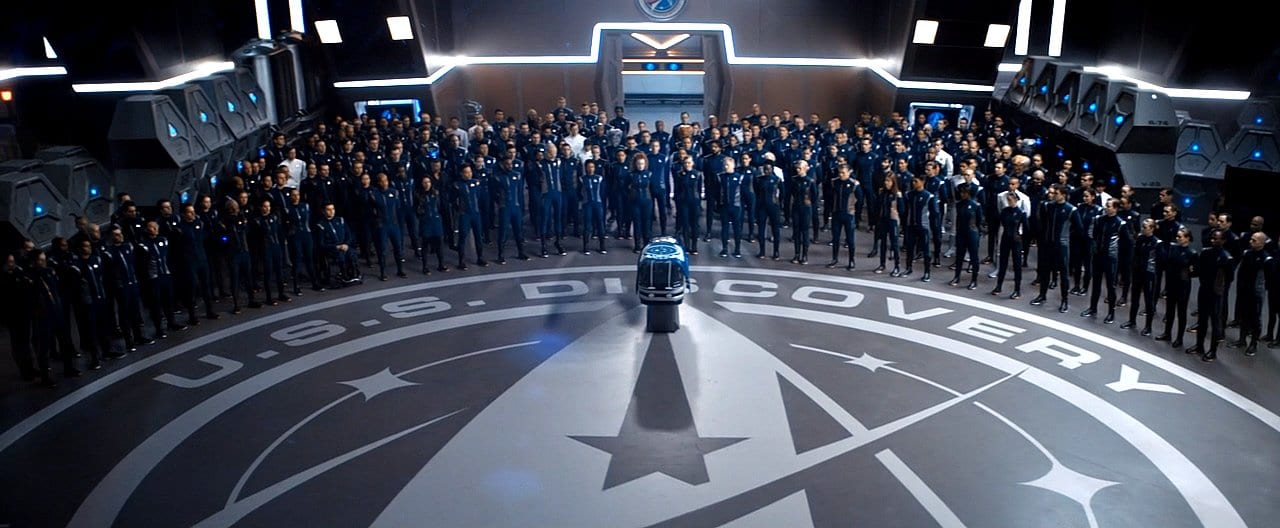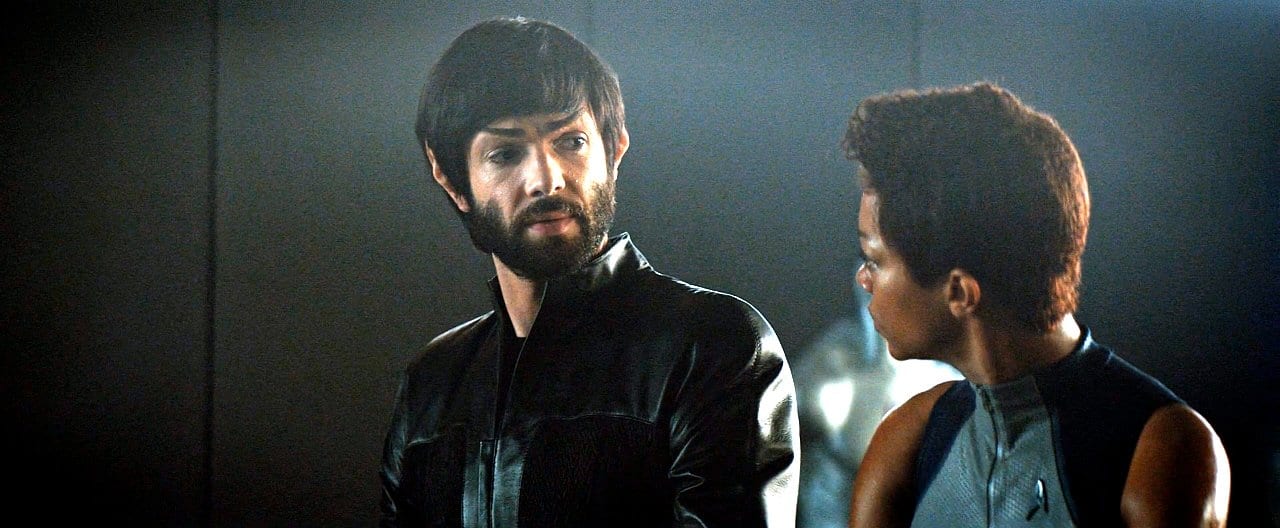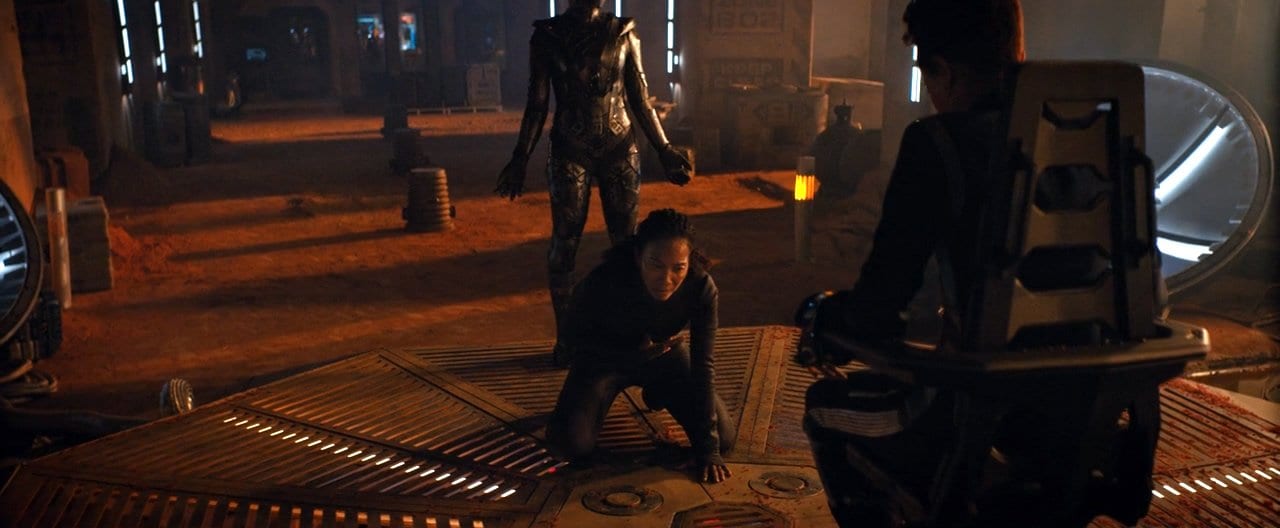This week’s episode of Star Trek: Discovery—”The Red Angel”—was a doozy. It was heavy on revelations, including two different reveals of the identity of the Red Angel and Section 31’s role in creating it, and Michael Burnham learning the truth of her parents’ deaths and that they worked for Section 31.
The episode opens with Airiam’s funeral. Airiam lost her life in the previous episode after having been compromised by Control, Section 31’s central computer, which had become infected by a future version of itself. It was nice to see the characters affected by the death of a comrade, not just in the funeral setting but as they have to continue to do their jobs, referencing a crew member who is no longer amongst them. However, it’s impossible to escape the fact that this tearful ceremony and the emotion that it inspires in the crew is for a character we literally knew nothing about before last week. Various crew members speak lovingly of their connection to Airiam, and what she meant to them, but had we seen even a scrap of evidence of that before now, it would have meant something to us too.
The one nice thing about this scene is that it gives us a chance to get a little bit of insight into Detmer, particularly her struggles with the injuries that she sustained during the Klingon War last season and the augmentations she has lived with since. But I fear that had it not been for this funeral—had it not been for Airiam’s death—we would never have gotten even that much. If Star Trek: Discovery wants us to care about these characters when they die, then the show really needs to invest a few minutes in them while they’re still alive. We need to see who these people are when they’re not on the bridge.

In fact, a great deal of this episode is about characters struggling to deal with their current situations. Burnham and security officer Nhan have a heartfelt confrontation about their roles in Airiam’s death—with Nhan following orders to open the airlock that spaced Airiam when Burnham couldn’t bring herself to do so—both searching for some absolution from the guilt they’re experiencing. Dr. Culber confides in Admiral Cornwell, a former psychologist, about his inability to settle into his new life after essentially being brought back to life after his murder, and especially his inability to feel anything for Stamets, his former partner. And Tyler continues to experience the push and pull of his dual nature as a Section 31 officer who doesn’t agree with every method that the organization employs.
At the center of this episode is the relationship between Spock and Burnham. At last, we’re seeing some evidence of a history between them. Spock’s revelation of Burnham’s great character flaw—her drive to take responsibility for circumstances beyond her control—comes across as the sort of thing a little brother would say about his big sister, and her reaction to his pronouncements is priceless. But the highlight is in seeing Spock console Burnham as she pounds her anger out on a punching bag, having just learned of Leland’s role in her parents’ deaths. “I’m sure Captain Leland appreciates your choice of high-density urethane foam in lieu of his nasal cartilage” just sounds like something Spock would say. Him using logic to reassure her and comfort her is, as she says, unexpected, especially after he berated her last episode.
Spock has always been a complex character, a being of two worlds trying desperately to only live in one. There’s a great deal of sensitivity and understanding in Ethan Peck’s performance that harkens back to that of Leonard Nimoy, and in spite of little touches like pronouncing the word “sensor” the same way Nimoy did, he never apes Nimoy’s take on the character. Peck honors the past and forges his own path at the same time in much the same way Zachary Quinto did in the film series.

As the title suggests, we now know who the Red Angel is. Truthfully, even though there were signs pointing in different directions, including some involvement from Airiam, we all pretty much knew that it would turn out to be Burnham, simply because most everything on this show is about Burnham in one way or another. Ensign Tilly confirms our suspicions early in the episode by discovering a file in Airiam’s system called Project Daedalus that contains a bio-neural signature of the Red Angel—and it’s an exact match with Burnham.
The crew devises a bold and rather insane plan—to lure the Red Angel and trap her. Spock realizes that the commonality in the Angel’s previous appearances is Michael’s safety—the Angel has only appeared at times when her life has been in danger, the first time being when she and Spock were children and Michael ran away from home and would have been killed by a wild beast out in the Vulcan Forge had the Angel not led Sarek and Amanda to her.
So the plan is simple—kill Michael and the Angel will appear. Right? I mean, aside from the small problem of if Michael had died as a kid then there would be no Future Michael to come back in time and save her. So Michael is only alive now because she was saved then from death by her future self who can only exist because her future self saved her. As Captain Janeway once said on Star Trek: Voyager: “Time travel. Since my first day on the job as a Starfleet captain I swore I’d never let myself get caught in one of these godforsaken paradoxes—the future is the past, the past is the future, it all gives me a headache.”
The plan works, and the Red Angel is caught. The being occupying the suit steps out and…it’s not Michael, but the mother that’s been dead since she was a young girl, whose death she blamed herself for. Burnham has really been put through the wringer in this episode, from losing a friend to finding out she’s the future entity everyone is after to learning about Leland’s role in her parents’ deaths and their involvement in Section 31 to rekindling her love for Tyler to facing her own death and only then finding out that she isn’t the future entity everyone is after—and then the Mack Truck hit of who the Red Angel actually is.
Michael has lived her whole life with the guilt that it was her fault that her parents had died—that they stayed on Doctori Alpha so that she could see a star go supernova and were therefore there when the Klingons attacked. Turns out the Klingons attacked to destroy the project that her parents were working on for Section 31. How will finally knowing that she isn’t responsible change her and her self-evaluation? Sonequa Martin-Green delivers an extraordinary performance, conveying so much of Burnham’s inner turmoil with just a look.

Michael’s emotional tornado looks to continue next week when she has her first real encounter with her mother and the Klingons show up to put an end to technology that they thought they’d destroyed years ago. Technology that her parents helped build. The Red Angel. We’ll find out in “Perpetual Infinity” on Thursday, March 28 on CBS All Access.

